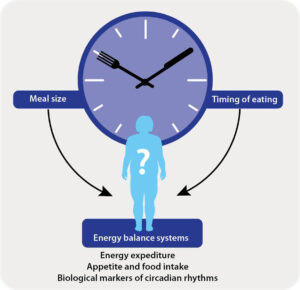We’ve all heard that diet and exercise are the cornerstones of a healthy lifestyle and effective weight management. But what if I told you there’s a third, often overlooked factor that could be sabotaging your efforts? Enter the world of sleep – that blissful state we often take for granted, yet plays a crucial role in our overall health and well-being.
Recent research has uncovered a fascinating connection between our sleep habits and our dietary choices. It turns out that how much we sleep, when we sleep, and even how well we sleep can significantly impact what we eat and how our bodies process those nutrients. Let’s dive into this eye-opening world of sleep and diet interactions!
The Sleep-Diet Connection: More Than Just Beauty Rest
First things first: how much sleep are we actually getting? Studies show that a whopping 34% of adults aged 19-64 are sleeping less than the recommended 7 hours per night. That’s a lot of tired people walking around! But why does this matter when it comes to our diets?
Well, it turns out that when we’re short on sleep, our bodies go a bit haywire. We tend to reach for more sugary and high-fat foods, and our overall diet quality takes a nosedive.
our sleep-deprived brains throw a tantrum and demand comfort food!
Sleep deprivation actually changes how our brains respond to food. It increases activity in the areas associated with reward and pleasure, making those donuts look even more irresistible. At the same time, it decreases activity in the regions responsible for rational decision-making. Talk about a recipe for dietary disaster!
Quality Matters: It’s Not Just About Quantity
Now, before you start setting your alarm for exactly 7 hours from now, let’s talk about sleep quality. It’s not just about how long you’re in bed – it’s about how well you’re sleeping during that time. Poor sleep quality, even if you’re in bed for the right amount of time, can lead to similar dietary pitfalls as not getting enough sleep.
Interestingly, there seems to be a two-way street here. Just as poor sleep can lead to unhealthy food choices, certain dietary habits can impact our sleep quality. For example, eating high-protein meals has been associated with improved sleep quality. It’s like a delicious cycle of health!
eating high-protein meals has been associated with improved sleep quality
Timing is Everything: The Social Jetlag Phenomenon
Here’s where things get really interesting. It’s not just about how much or how well we sleep – it’s also about when we sleep. Enter the concept of “social jetlag.” This isn’t about flying across time zones; it’s about the mismatch between our body’s natural sleep rhythm and our social obligations.
Many of us experience this every week. We stay up late and sleep in on weekends, then struggle to adjust back to early wake-ups on Monday. This constant shifting of our sleep schedule is like giving ourselves jetlag every week. And guess what? It’s associated with poorer diet quality and increased snacking on less healthy foods.
In fact, about 14% of adults have a difference of more than 2 hours in their sleep duration between weekdays and weekends. That’s a lot of social jetlag! And it’s not just affecting our Monday morning mood – it’s impacting our food choices throughout the week.
The Night Shift Conundrum
Speaking of disrupted sleep schedules, let’s talk about shift work. About 14% of the working population are shift workers, and they face unique challenges when it comes to sleep and diet. Night shift work is associated with increased risk of obesity and metabolic disorders, and part of this risk may be due to changes in eating patterns.
Shift workers often find themselves eating at unusual times, snacking more frequently, and choosing less healthy options. It’s not their fault – our bodies aren’t designed to be awake and eating when it’s dark outside. But understanding these challenges is the first step in finding solutions.
The Science Behind the Sleepy Munchies
So why does lack of sleep make us reach for that extra cookie? There are a few factors at play here. First, sleep deprivation can mess with our hunger hormones. It increases levels of ghrelin (the “I’m hungry” hormone) and decreases leptin (the “I’m full” hormone). It’s like our body’s way of saying, “Hey, we’re tired! We need more energy!”
But it’s not just about hormones. Remember how we mentioned that sleep affects brain activity? Well, studies have shown that sleep deprivation can actually enhance the brain’s response to food smells. That’s right – those cinnamon rolls might actually smell better when you’re tired!
And let’s not forget about decision-making. When we’re tired, our prefrontal cortex (the part of our brain responsible for complex decision-making) doesn’t function as well. This can lead to more impulsive food choices and less ability to resist temptation.
Sleep Is Overlooked in Weight Management
Given all this evidence, it’s surprising that sleep advice isn’t a standard part of most weight management programs. But that might be changing. Some studies have started to look at incorporating sleep advice into weight loss interventions, and the results are promising.
One study found that participants who received sleep advice along with diet and exercise guidance lost more weight than those who only received diet and exercise advice. It’s like unlocking a secret weapon in the battle against the bulge!
But before you throw out your diet plan and invest in blackout curtains, it’s important to note that more research is needed in this area. The relationship between sleep and weight is complex, and we’re still learning about how best to leverage this connection for health benefits.
Practical Tips for Better Sleep and Better Eating
So, what can we do with all this information? Here are some practical tips to help you harness the power of sleep for better eating habits:
- Aim for consistency – Try to go to bed and wake up at the same time every day, even on weekends. Your body (and your diet) will thank you!
- Create a sleep-friendly environment -Keep your bedroom dark, quiet, and cool. Consider investing in comfortable bedding and pillows.
- Wind down before bed – Establish a relaxing bedtime routine. This might include reading a book, taking a warm bath, or practicing some gentle yoga or meditation.
- Watch what you eat before bed – Avoid large meals, caffeine, and alcohol close to bedtime. These can all interfere with sleep quality
- Get moving during the day – Regular exercise can help improve sleep quality. Just be sure to finish your workout at least a few hours before bedtime.
- Manage stress – High stress levels can interfere with sleep. Try incorporating stress-management techniques like deep breathing or mindfulness into your daily routine.
- Be mindful of screen time – The blue light from phones, tablets, and computers can interfere with your body’s natural sleep-wake cycle. Try to limit screen use in the hour before bed.
The Future of Sleep and Diet Research
As we look to the future, there’s still much to learn about the intricate dance between sleep and diet. Researchers are exploring how factors like age, sex, and individual circadian rhythms might influence these relationships. They’re also investigating how changes in work patterns, like the increase in remote work during the COVID-19 pandemic, might impact our sleep and eating habits.
One exciting area of opportunity is the potential for personalized sleep and diet interventions. Just as we’re learning that there’s no one-size-fits-all approach to diet, the same may be true for sleep. In the future, we might see sleep recommendations tailored to individual needs and lifestyles, working in harmony with personalized nutrition advice.
Wrapping It Up: Sleep Your Way to Better Health
As we’ve seen, the relationship between sleep and diet is complex and fascinating. Poor sleep can lead to poor food choices, which can in turn lead to poor sleep – it’s a vicious cycle. But the good news is that by understanding these connections, we can start to break the cycle and make positive changes.
Remember, getting enough good quality sleep isn’t just about feeling refreshed in the morning. It’s about setting yourself up for success throughout the day – including making healthier food choices. So the next time you’re tempted to stay up late binge-watching your favorite show, remember: your waistline (and your overall health) might thank you for hitting the hay instead!
Sweet dreams and happy eating, everyone!
Key Takeaways
- Prioritize sleep: Aim for 7-9 hours of quality sleep each night. Your food choices (and your body) will thank you!
- Consistency is key: Try to maintain a regular sleep schedule, even on weekends. This can help reduce ‘social jetlag’ and improve your overall diet quality.
- Create a sleep-friendly environment: Invest in making your bedroom a sleep sanctuary. Dark, quiet, and cool is the way to go.
- Be mindful of pre-bed habits: Watch what you eat and drink in the hours before bed, and try to limit screen time.
- Consider sleep in your weight management strategy: If you’re trying to lose weight or maintain weight loss, don’t forget about the importance of good sleep habits alongside diet and exercise.
Additional Reading















